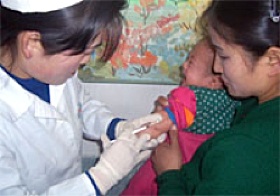 Measles deaths have plummeted by some 74 percent worldwide since 2000, the United Nations announced yesterday. Thanks to improvements in routine and immunization activities, the number of people dying from measles each year dropped from an estimated 750,000 to 197,000 between 2000 and 2007.
Measles deaths have plummeted by some 74 percent worldwide since 2000, the United Nations announced yesterday. Thanks to improvements in routine and immunization activities, the number of people dying from measles each year dropped from an estimated 750,000 to 197,000 between 2000 and 2007.
In the same period, massive efforts by the Eastern Mediterranean countries – including Afghanistan, Pakistan, Somalia and the Sudan – have cut measles deaths from 96,000 to 10,000, achieving three years ahead of time the UN goal of reducing measle deaths by 90 percent. These major successes were a result of ramping up vaccination campaigns, with more than twice the number of children immunized in 2007 compared to the previous year, thanks to the hard work of national governments, volunteers and partners in the Measles Initiative.
“Countries must plan and budget for periodic nationwide measles vaccination campaigns to make sure all children are protected by vaccination. If this is not done systematically we could see a reversal of the gains made,” he added.
The progress was announced at a press conference Dec. 4 by the partners of the Measles Initiative – the UN Children’s Fund, the UN Foundation and WHO, as well as the American Red Cross and the United States Centers for Disease Control and Prevention of (CDC) – ahead of today’s WHO report, which will include the latest data on measles mortality.
Although more than 3.6 million lives have been saved, measles is still one of the leading killers of children worldwide, with an estimated 540 dying each day from the disease, the Initiative said.
Africa saw the largest decrease in measles deaths, accounting for roughly 63 percent of the reduction in worldwide deaths over the eight-year period.
In 2007, however, measles outbreaks occurred in a number of African countries due to gaps in immunization coverage, reinforcing the need to remain vigilant against the disease. Of the estimated 197,000 measles related deaths in 2007, 90 per cent or an estimated 177,000 were children, who died before their fifth birthday.
South-East Asia only experienced a 42 percent decline in measles deaths due to the delayed implementation of large-scale vaccination campaigns in India, which currently accounts for two-thirds of global measles deaths.
Success in reaching the 2010 goal of reducing measles death by 90 per cent worldwide depends on ensuring that all children receive two doses of the measles vaccine including one dose by their first birthday, strengthening disease surveillance systems and providing effective treatment for measles.
“Progress also depends on addressing the considerable funding gap,” said Executive Vice President and Chief Operating Officer for the UN Foundation Kathy Calvin.
“Currently the shortfall stands at $176 million for 2009-2010, of which $35 million is urgently needed for 2009. During these tough economic times it is important to remember that prevention is always more cost effective in the long run than treatment,” said Ms. Calvin.
“For only a $1 a vaccination, measles can be prevented,” she added.



















